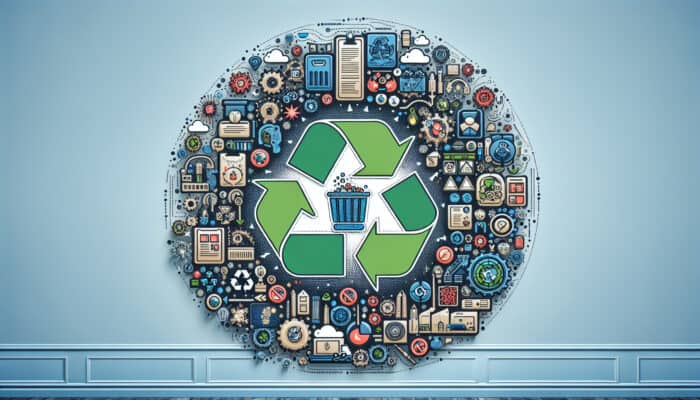In-Depth Examination of Waste Disposal Regulations in the UK
Understanding the Key Regulations for Responsible Waste Disposal

The legal framework for waste disposal in the United Kingdom is meticulously structured to protect the environment and public health while promoting effective and responsible management practices. Central to this framework is the Environmental Protection Act 1990, which delineates the essential duties and responsibilities necessary for effective waste management. This legislation mandates that all waste must be managed in a manner that minimises its environmental impact. Additionally, the Waste (England and Wales) Regulations 2011 expand upon these principles, requiring businesses to adopt efficient and sustainable waste management practices. Grasping the intricacies of these regulations is crucial for both organisations and individuals to ensure adherence and foster responsible waste management.
These regulations stipulate that waste must be correctly treated and disposed of through environmentally sound methods. This includes the classification of waste, which is vital for identifying hazardous materials that require special management protocols. The regulations also emphasise the importance of waste reduction at the source, prioritising recycling and recovery methods over mere disposal. Adhering to these laws allows entities to contribute to the UK’s overarching environmental sustainability objectives while avoiding substantial penalties linked to non-compliance.
Enforcement of Duty of Care Requirements in Waste Management
The principle of duty of care necessitates that all parties involved in waste production within the UK assume responsibility for their waste from its inception to disposal. This legal obligation compels waste producers to ensure that their waste is only transferred to authorised individuals or organisations. Furthermore, businesses must maintain comprehensive records of waste transfers, accurately documenting what has been disposed of, the waste’s destination, and the methods of disposal utilised. This rigorous record-keeping is instrumental for accountability and adherence to legal standards.
Moreover, businesses are mandated to demonstrate due diligence when selecting waste carriers and disposal facilities. This entails verifying that the selected carrier possesses the necessary licenses and complies with all environmental regulations. Failure to meet these duty of care obligations can result in severe legal repercussions, including hefty financial penalties and damage to reputation. By fostering a culture of responsibility in waste management practices, companies not only comply with legal standards but also contribute actively to environmental conservation efforts.
Understanding the Implications of Illegal Waste Disposal
Illegal waste disposal in the UK is treated with extreme seriousness, resulting in stringent penalties designed to deter such activities. Offenders can face fines that may reach up to £50,000 for significant violations of waste regulations. The severity of these penalties often correlates with the nature and extent of the violation, with repeat offenders facing even more severe fines. Furthermore, individuals convicted of grave offences, such as large-scale illegal dumping or mishandling hazardous waste, may face imprisonment for a duration of up to five years.
Local authorities and the Environment Agency are proactive in pursuing legal actions against those involved in illegal waste practices. This enforcement not only protects the environment but also highlights the importance of adhering to established waste disposal regulations. By understanding the potential ramifications of illegal dumping, both individuals and businesses can appreciate the significance of adopting responsible waste management practices. Ultimately, compliance with the law ensures legal safety while promoting a healthier environment for all.
Examining Different Waste Types and Disposal Methods in the UK

Best Practices for Hazardous Waste Management
The management of hazardous waste in the UK is strictly regulated to safeguard human health and protect the environment. Hazardous waste includes materials that pose significant risks, such as chemicals, batteries, and certain electronic devices. The disposal and handling of such waste must be conducted by professionals trained in hazardous waste management practices. Licensed facilities are required to adhere to stringent environmental standards to ensure safe disposal.
Waste producers must accurately classify their waste to ascertain whether it is hazardous. This classification informs the disposal method, which often necessitates specialised treatment processes designed to neutralise or securely contain harmful substances. Neglecting proper hazardous waste management can result in severe environmental repercussions, including soil and water contamination. Engaging licensed waste carriers ensures that hazardous materials are transported and disposed of in accordance with legal requirements, significantly mitigating the risks associated with improper disposal.
Comprehensive Overview of General Waste Disposal Methods
General waste disposal in the UK encompasses a variety of methods, each aimed at minimising environmental impact. The primary disposal options include recycling, landfill, and incineration. Recycling is highly promoted as it diverts waste from landfills and conserves natural resources. The UK government has introduced numerous initiatives designed to increase recycling rates, which have significantly heightened public awareness regarding the importance of sorting recyclable materials, including paper, plastics, and metals.
Although landfill remains a common disposal method, particularly for non-recyclable waste, the UK is actively striving to decrease its dependence on landfills by encouraging alternative disposal methods and setting more ambitious recycling targets. Incineration serves as another option for waste that cannot be recycled, where waste is burned to generate energy, substantially reducing the volume of waste directed to landfills. However, incineration facilities must comply with environmental regulations to minimise emissions and other adverse effects on air quality.
Best Practices for Electronic Waste Disposal

Disposing of electronic waste, commonly referred to as e-waste, requires careful consideration to avoid environmental contamination. E-waste includes items such as computers, televisions, and mobile phones, which frequently contain hazardous materials. The UK encourages individuals and businesses alike to dispose of e-waste at designated recycling centres that are equipped to manage such materials safely.
Implementing best practices for e-waste disposal involves several essential steps:
- Identify and separate e-waste from general waste.
- Locate a local recycling centre that accepts e-waste.
- Remove all personal data from devices prior to disposal.
- Ensure the recycling centre is licensed to handle e-waste.
- Consider donating functioning devices to charitable organisations or schools.
- Stay informed about local regulations regarding e-waste disposal.
By adhering to these practices, individuals can manage their electronic waste in a responsible manner, contributing to a circular economy where materials are reused and recycled rather than discarded. This conscientious approach not only safeguards the environment but also promotes a culture of sustainability.
Choosing a Licensed Waste Carrier in the UK: Essential Considerations
Key Qualifications for a Licensed Waste Carrier
Selecting a licensed waste carrier is crucial for ensuring that your waste is managed legally and responsibly. In the UK, waste carriers must be registered with the Environment Agency and possess the necessary qualifications for legal operation. This registration guarantees compliance with environmental regulations and the ability to handle various types of waste, including hazardous materials.
When choosing a waste carrier, it is essential to obtain their registration number and verify their credentials. Legitimate carriers are required to provide proof of insurance, which protects against potential liabilities arising during waste handling and transportation. This insurance is a vital aspect of safeguarding both parties involved in the waste transfer process. It is advisable to select carriers with established reputations and positive feedback from previous clients, as this reflects their dedication to compliance and responsible waste management practices.
How to Verify the Legitimacy of a Waste Carrier
Verifying a waste carrier’s legitimacy is an essential step in ensuring adherence to UK waste regulations. To confirm a carrier’s registration, check the Environment Agency’s website, where you can search for registered waste carriers by name or registration number. This online resource provides a straightforward method to ensure that the carrier is authorised to transport waste and is knowledgeable about relevant regulations.
Additionally, it is prudent to request waste transfer notes from the carrier, which serve as documentation of the waste being transferred. These notes should detail the type and volume of the waste involved. Maintaining these records is crucial for compliance and may be useful in any future inquiries regarding waste disposal. By taking these measures, you can confidently engage a licensed waste carrier, minimising the risk of legal complications and ensuring responsible waste management.
Steps to Take If You Suspect Illegal Waste Carrying
If you suspect that a waste carrier is operating outside the law, it is imperative to take immediate action to protect the environment and public health. Report your concerns to the Environment Agency or your local council, providing as much detailed information as possible. This information may include the waste carrier’s name, vehicle registration number, the location of the suspected illegal activity, and a description of the waste being handled.
The Environment Agency treats reports of illegal waste activities with utmost seriousness and has the authority to conduct thorough investigations into such cases. By reporting suspicious behaviour, you contribute to the enforcement of waste regulations and assist in protecting your community from potential environmental hazards. Public vigilance is essential in combating illegal waste practices, as many offenders operate covertly, endangering both environmental integrity and community health.
What Documentation to Expect from a Waste Carrier
When collaborating with a licensed waste carrier, it is essential to secure proper documentation to ensure compliance with UK waste regulations. You should receive a waste transfer note that clearly outlines the specifics of the waste being transferred. This document must include descriptions of the waste, the quantity, and the transport location. Retaining a copy of this note is crucial, as it serves as a record of compliance for your waste management practices.
In addition to the waste transfer note, you should also receive information regarding the waste carrier’s registration and proof of insurance. This documentation confirms that the carrier is authorised to transport waste and is financially protected against liabilities. It is advisable to keep these documents for a minimum of two years, as they may be required for audits or inspections by regulatory authorities. By ensuring that all necessary documentation is in place, you can confidently meet your legal obligations surrounding waste disposal.
Strategies for Maintaining Compliance with Waste Regulations
To ensure compliance with UK waste regulations, adopting a proactive approach to waste management is essential. Regularly reviewing your waste carrier’s registration is critical to verify their ongoing adherence to the law. Engage with carriers who are transparent about their operations and can provide updated documentation regarding their licensing status.
Maintaining thorough records of all waste transfer notes is equally important. Ensure these documents are accurately completed, providing detailed descriptions of the waste, quantities, and final disposal methods. Retaining these records for a minimum of two years is a legal requirement and can safeguard you in the event of inquiries from regulatory bodies. Additionally, consider implementing a waste management policy within your organisation that outlines procedures for selecting waste carriers, handling waste, and ensuring regulatory compliance. Through diligent oversight and a commitment to responsible practices, you can effectively navigate the complexities of UK waste legislation.
Expert Insights on Legal Waste Disposal in the UK
Current Trends Shaping Waste Management Practices
The waste management landscape in the UK is continuously evolving, with recent trends reflecting a growing commitment to sustainability and operational efficiency. A significant trend is the increase in recycling rates, attributed to heightened public awareness and government initiatives that encourage responsible waste disposal. Local councils have implemented programs to motivate residents to sort and recycle their waste, leading to improved recovery rates across various materials.
Another emerging trend is the adoption of circular economy principles, where waste is viewed not merely as a by-product but as a valuable resource to be reused and recycled. For instance, organisations like the Waste and Resources Action Programme (WRAP) have launched initiatives aimed at reducing food waste and promoting recycling within the hospitality sector. These efforts have not only contributed to environmental goals but have also demonstrated economic benefits for businesses through cost savings and efficiency enhancements.
Moreover, many businesses are now embracing sustainability as a core value, actively seeking to reduce waste generation and enhance their recycling efforts. Real-world examples include companies implementing zero-waste policies and establishing partnerships with organisations focused on sustainable waste management solutions. These trends signify a substantial shift in the perception and management of waste in the UK, paving the way for a more sustainable future.
Enhancing Waste Disposal Practices in Businesses
Businesses play a crucial role in improving waste disposal practices, not only to comply with regulations but also to demonstrate corporate responsibility. One effective strategy is to implement waste reduction programs that emphasise minimising waste generation. This can involve conducting waste audits to identify areas for improvement, optimising packaging, and sourcing materials that are easier to recycle.
Training staff is another essential component in enhancing waste disposal practices. Providing education on proper waste sorting and disposal methods empowers employees to make informed decisions that positively influence the company’s waste management efforts. Furthermore, cultivating a culture of sustainability within the workplace can lead to innovative solutions and increased employee engagement in waste reduction initiatives.
Collaborating with sustainable waste management companies is also an excellent strategy for businesses seeking to improve their waste disposal practices. These companies specialise in implementing best practices aligned with environmental regulations and can offer tailored solutions based on the specific needs of the business. By partnering with experts in the field, organisations can develop comprehensive waste management strategies that not only meet compliance standards but also contribute to a more sustainable operational model.
The Impact of Government Policies on Waste Management
Government policies in the UK significantly influence waste management practices and advocate for sustainable disposal methods. Initiatives like the Waste and Resources Action Programme (WRAP) aim to reduce waste through education, guidance, and financial support for businesses and local authorities. This program has been instrumental in driving improvements in recycling rates and promoting responsible waste disposal practices across various sectors.
Additionally, the UK government has set ambitious targets for reducing single-use plastics and promoting the circular economy. These policies encourage businesses and consumers to reassess their consumption habits and consider the environmental impact of their choices. For example, the introduction of the Plastic Packaging Tax aims to incentivise manufacturers to utilise recycled materials, thereby decreasing the production of plastic waste.
Moreover, ongoing legislative developments indicate a commitment to enhancing waste management systems. Future policies may focus on increasing recycling targets, reducing landfill usage, and implementing stricter regulations on waste disposal. By aligning with government initiatives and policies, businesses can not only ensure compliance but also contribute to the overarching goal of establishing a sustainable waste management system in the UK.
Effective Household Waste Management Practices in the UK
Identifying Items Eligible for Recycling at Home
Households across the UK play a pivotal role in recycling efforts, as local councils provide services that facilitate the recycling of a variety of materials. Commonly accepted items for recycling include paper, plastics, metals, and glass. Each local authority specifies which recyclable materials they collect, making it essential for residents to review their council’s guidelines to ensure proper sorting.
For example, most councils accept paper products such as newspapers, cardboard, and office paper. Plastic recycling typically includes bottles, containers, and packaging, but it is crucial to ensure these items are clean and devoid of contaminants. Metal cans, such as food and drink containers, are generally accepted, while glass recycling usually encompasses bottles and jars.
Participating in local recycling initiatives not only reduces waste directed to landfills but also conserves resources and energy expended in producing new materials. By actively engaging in recycling at home, individuals can make substantial contributions to the UK’s sustainability goals. It is advisable to stay updated on any changes to recycling guidelines, as councils frequently revise their policies based on evolving environmental standards.
Strategies for Responsible Garden Waste Disposal
Responsible disposal of garden waste is a crucial aspect of household waste management. In the UK, residents have several options for managing garden waste, including home composting, utilising local recycling centres, or taking advantage of garden waste collection services offered by some councils. Composting stands out as one of the most environmentally friendly methods, transforming organic waste into nutrient-rich compost for gardens.
For those who prefer not to compost, local recycling centres often accept garden waste, including grass cuttings, leaves, branches, and other organic materials. Some councils provide dedicated garden waste collection services, typically for a nominal fee, allowing residents to place their waste in designated bins for convenient pickup. This service is particularly beneficial for households with larger quantities of garden waste that may not be suitable for home composting.
It is vital to ensure that garden waste is free from contaminants, such as plastic bags or non-biodegradable materials, to facilitate efficient recycling. By utilising the available disposal methods for garden waste, residents can significantly reduce their environmental footprint and contribute positively to the health of local ecosystems.
Proper Management of Bulky Waste Items
Bulky waste items, such as old furniture, mattresses, and large appliances, necessitate specific disposal methods to ensure they are managed appropriately. In the UK, residents can take bulky items to local recycling centres, where they are often accepted for recycling or safe disposal. Many councils also offer collection services for bulky waste, typically requiring residents to schedule a collection in advance, sometimes for a nominal fee.
When disposing of bulky items, it is advisable to consult with local authorities regarding their specific policies and guidelines. Some charities may accept certain items for reuse, presenting an excellent opportunity to give items a second life while supporting local organisations. Donating functional items not only aids in waste reduction but also assists those in need.
Proper disposal of bulky waste is essential to prevent illegal dumping and littering, which can have harmful effects on the environment. By adhering to local guidelines and exploring all available disposal options, residents can ensure that bulky waste is managed responsibly and sustainably.
Handling Hazardous Household Waste Safely
Proper disposal of hazardous household waste is critical due to the significant risks it poses to both health and the environment. Items that fall into this category include batteries, chemicals, paints, and certain electronics, which must be handled with care. In the UK, hazardous waste should not be mixed with general waste; it should instead be taken to designated recycling facilities or disposal sites that are equipped to manage such materials safely.
Many local councils provide specific collection services or drop-off points for hazardous waste, ensuring safe handling and disposal. For instance, batteries can usually be returned at retail locations that offer recycling services. Residents should consult their local authority for guidance on disposing of specific hazardous items to ensure compliance with regulations.
Improper disposal of hazardous waste can lead to severe environmental contamination and pose health risks to the community. By following appropriate disposal guidelines and taking necessary precautions, individuals can significantly mitigate these risks, protect their environment, and adhere to UK regulations.
Managing Commercial Waste Effectively in the UK
Key Requirements for Responsible Commercial Waste Management
Commercial waste in the UK is subject to strict regulations, requiring businesses to manage their waste responsibly to comply with environmental laws. Companies must segregate their waste at the source, ensuring that recyclable materials are separated from general waste. This segregation is crucial for maximising recycling rates and minimising the volume of waste sent to landfills.
Additionally, businesses are required to utilise licensed waste carriers for transporting waste. This guarantees that all waste is handled legally and that the carriers comply with stringent environmental standards. Keeping accurate records of waste transfers is another requisite, allowing businesses to demonstrate compliance during audits or inspections.
It is also essential for businesses to stay informed about local regulations regarding commercial waste management, as these can vary by region. By adhering to these requirements, businesses can avoid legal repercussions while contributing to a more sustainable waste management system.
Implementing an Effective Waste Management Plan
Developing a comprehensive waste management plan is crucial for businesses looking to enhance their waste disposal practices. A successful plan begins with assessing the types and quantities of waste generated, which can be accomplished through a thorough waste audit. Identifying common waste streams allows businesses to create targeted strategies for reduction and recycling.
Establishing clear waste reduction goals is the next step in formulating an effective waste management plan. This may involve initiatives such as minimising packaging materials, optimising production processes, or encouraging staff engagement in sustainability efforts. Additionally, businesses should determine appropriate disposal methods for various waste types, ensuring compliance with regulatory requirements.
To create a robust waste management plan, consider the following steps:
- Conduct a waste audit to assess current waste generation.
- Set specific waste reduction targets.
- Select responsible disposal methods for various waste types.
- Engage employees in sustainability initiatives.
- Regularly review and adjust the waste management plan as needed.
By following these steps, businesses can enhance their waste management practices, reduce their environmental impact, and comply with UK regulations.
Advantages of Effective Waste Segregation
Waste segregation is a vital practice that delivers significant benefits for businesses and the environment. By categorising waste into distinct groups, such as recyclables, organic waste, and general refuse, companies can improve recycling rates and decrease the amount of waste sent to landfills. This not only benefits the environment but can also lead to cost savings related to disposal fees.
Furthermore, effective waste segregation contributes to compliance with UK regulations, as businesses are required to manage their waste responsibly. Proper segregation simplifies tracking waste disposal and ensures that materials are processed accurately. This can enhance a company’s reputation as a responsible and environmentally conscious organisation, attracting customers and partners who prioritise sustainability.
Additionally, segregated waste facilitates better recovery and recycling processes. When materials are sorted correctly, they can be processed more efficiently, leading to higher-quality recycled products. This supports the circular economy and reduces the necessity for virgin materials, contributing to overall resource conservation.
Environmental Implications of Waste Disposal Practices in the UK
The Environmental Impact of Landfill Sites
Landfill sites in the UK can exert detrimental effects on the environment if not managed properly. A significant concern is soil and water contamination, as leachate from landfills can seep into the ground and pollute local water sources. This contamination poses serious health risks to both humans and wildlife, making effective landfill management paramount.
Another environmental issue associated with landfills is the emission of greenhouse gases, particularly methane, which is released during the decomposition of organic waste. Methane is a potent greenhouse gas that significantly contributes to climate change. By diverting organic waste from landfills through composting and recycling, the UK can lessen these emissions and mitigate their impact on the climate.
Moreover, landfills can lead to a loss of biodiversity, as the land occupied by landfill sites often displaces natural habitats. Implementing proper management practices, such as landfill restoration and employing environmentally friendly technologies, can help alleviate these impacts. Ultimately, reducing reliance on landfills through increased recycling and waste minimisation strategies is crucial for environmental protection.
Environmental Benefits of Recycling Initiatives
Recycling offers numerous environmental advantages that contribute to a more sustainable future. One significant benefit is the reduction of landfill space required for waste disposal. By recycling materials such as paper, plastics, and metals, the UK can conserve valuable land resources and lessen the strain on landfill sites.
Additionally, recycling conserves natural resources by reusing materials instead of extracting new ones. This process typically requires significantly less energy than producing new products from raw materials, resulting in lower greenhouse gas emissions and a smaller carbon footprint. For instance, recycling aluminium uses up to 95% less energy than creating new aluminium from ore.
Recycling also fosters a circular economy, where materials are kept in circulation for as long as possible, thereby minimising waste generation. This approach benefits the environment and supports local economies by generating jobs in the recycling and waste management sectors. By embracing recycling practices, the UK can make substantial progress toward sustainability goals and environmental protection.
Waste-to-Energy Initiatives and Their Contribution to Sustainability
Waste-to-energy (WtE) facilities in the UK represent an innovative approach to managing waste sustainably while generating renewable energy. These facilities convert non-recyclable waste into electricity or heat through processes like incineration or anaerobic digestion. By doing so, they significantly reduce the volume of waste that would otherwise end up in landfills.
WtE contributes to environmental sustainability by providing a renewable energy source that can power homes and businesses. This process not only diverts waste from landfills but also helps reduce greenhouse gas emissions associated with traditional waste disposal methods. Furthermore, WtE facilities are often designed to minimise harmful emissions, ensuring that energy generation is both effective and environmentally responsible.
In addition to energy production, WtE facilities can recover valuable materials from waste, contributing to resource conservation. For example, metals can be extracted for recycling, further bolstering the circular economy. By investing in waste-to-energy technologies, the UK can enhance its waste management infrastructure, decrease landfill dependency, and progress toward a more sustainable energy future.
The Dangers Associated with Illegal Dumping
Illegal dumping poses significant risks to both the environment and public health in the UK. It frequently results in soil and water contamination, as hazardous materials are improperly disposed of in natural settings. This contamination can have long-lasting effects on local ecosystems and may pose health hazards for communities residing near illegal dumping sites.
Moreover, illegal dumping can strain local authorities and waste management resources, as they must allocate funds and personnel to clean up these sites. This diversion of resources can impede legitimate waste management initiatives and diminish the overall efficiency of waste disposal systems. The presence of illegally dumped waste can also adversely affect local communities, leading to decreased property values and a declining quality of life.
Legal consequences for individuals or businesses caught engaging in illegal dumping can be severe, resulting in hefty fines, criminal charges, and reputational damage. By adhering to waste disposal regulations and promoting responsible waste management practices, communities can collaborate to combat illegal dumping and protect their environment.
Strategies for Effective Waste Reduction in the UK
The Importance of Embracing a Circular Economy
The circular economy plays a pivotal role in waste reduction strategies in the UK, focusing on keeping materials in use for as long as possible. This approach contrasts with the traditional linear economy, which follows a ‘take-make-dispose’ model, leading to excessive waste generation. By prioritising reuse, repair, and recycling, the circular economy promotes sustainable resource management and minimisation of waste.
In the UK, various initiatives are being launched to facilitate the transition toward a circular economy. For example, programs emphasising product design encourage manufacturers to create goods that are easier to repair and recycle. By adopting circular economy principles, businesses can lessen their environmental impact while creating new economic opportunities through innovative products and services.
Moreover, the circular economy fosters collaboration among businesses, governments, and consumers. By working together to promote sustainable practices, stakeholders can drive systemic changes in consumption patterns and waste management. This collaborative approach enhances resource efficiency and supports the UK’s broader environmental goals, including reducing greenhouse gas emissions and fostering sustainable growth.
How Individuals Can Contribute to Waste Reduction Efforts
Individuals are integral to waste reduction efforts and can significantly impact through simple, daily actions. One effective strategy is to prioritise reusing items instead of discarding them. This can involve repurposing containers, donating unwanted items to charities, or participating in local exchange programs that promote sharing goods.
Composting organic waste at home is another excellent method for individuals to minimise their waste footprint. By composting fruit and vegetable scraps, yard waste, and other organic materials, households can divert waste from landfills and create nutrient-rich compost for gardens. This practice not only reduces waste but also contributes to healthier soil and sustainable gardening practices.
Choosing products with minimal packaging and opting for bulk purchasing can also aid in reducing waste. Additionally, being conscious of consumption habits and prioritising sustainable products fosters a culture of waste reduction. By taking these small yet impactful steps, individuals can contribute significantly to the UK’s waste reduction objectives and advocate for a more sustainable lifestyle.
Government Initiatives Supporting Waste Reduction in the UK
The UK government has instituted various initiatives aimed at decreasing waste and promoting sustainable practices among both businesses and consumers. The Resources and Waste Strategy serves as a key policy framework that outlines the government’s dedication to reducing waste and enhancing recycling rates nationwide. This strategy encompasses measures to address single-use plastics and promote the circular economy.
Another notable initiative is the Plastic Packaging Tax, designed to incentivise manufacturers to utilise recycled materials in packaging. By encouraging sustainable material use, this tax aims to diminish plastic waste and promote responsible consumption. Additionally, the government has launched awareness campaigns to educate the public on recycling and waste reduction, engaging communities in sustainable practices.
Local authorities also play a pivotal role in waste reduction initiatives, often providing resources and support for residents to manage waste responsibly. These initiatives may include recycling programs, community clean-up events, and educational workshops focused on sustainable living. By embracing these government initiatives, individuals and businesses can contribute to waste reduction and foster a more sustainable future.
- Resources and Waste Strategy
- Plastic Packaging Tax
- Community recycling initiatives
- Public awareness campaigns on sustainability
- Support for composting and organic waste management
Future Directions in Waste Disposal Practices in the UK
Innovative Solutions Transforming Waste Management Approaches
Innovations in waste management are swiftly reshaping the landscape of waste disposal in the UK, introducing new technologies and methodologies that enhance efficiency and sustainability. One notable innovation is the development of smart waste bins equipped with sensors that monitor fill levels. These bins optimise collection routes, reducing fuel consumption and improving service efficiency for waste management companies.
Advanced recycling technologies are also emerging, allowing for more effective separation and processing of materials. For instance, advancements in chemical recycling enable the breakdown of complex plastics into their base materials, which can then be reused to manufacture new products. Such technologies enhance recycling rates and support the circular economy by ensuring that more materials remain in circulation.
Furthermore, waste-to-energy technologies are evolving, with new facilities designed to maximise energy recovery from non-recyclable waste. These developments are crucial for decreasing landfill reliance and generating renewable energy sources. By embracing these innovations, the UK can enhance its waste management systems, reduce environmental impacts, and progress toward a more sustainable future.
Adapting Legislation to Meet Evolving Needs
The future of waste disposal legislation in the UK is expected to undergo significant changes in response to emerging environmental challenges and sustainability objectives. Anticipated revisions may focus on further reducing landfill use, increasing recycling targets, and implementing stricter regulations on waste disposal practices. These legislative updates will likely stress the importance of adopting circular economy principles and promoting sustainable resource management.
As public awareness of environmental issues continues to rise, there may be increased pressure on policymakers to enforce more robust waste management regulations. This could involve expanded responsibilities for businesses in waste management and stricter penalties for illegal dumping and non-compliance.
Additionally, as new technologies and methods for waste management emerge, legislation will need to adapt to ensure that these innovations are effectively integrated into existing frameworks. Staying informed about these changes is crucial for both individuals and businesses to remain compliant and positively contribute to waste management efforts in the UK.
The Role of Public Awareness in Successful Waste Management
Public awareness is a fundamental element of effective waste management and disposal in the UK. As communities become more informed about the environmental impacts of waste and the significance of responsible disposal practices, they are more likely to engage in sustainable behaviours. Educational campaigns and community initiatives are vital for raising awareness and fostering a culture of sustainability.
Increased public awareness can lead to greater participation in recycling programs and support for local waste management initiatives. When individuals understand the repercussions of illegal dumping and the advantages of recycling, they are more inclined to take action to minimise waste and protect the environment.
Moreover, as consumers demand sustainable practices from businesses, public awareness can drive change within industries, compelling companies to adopt more environmentally friendly policies and practices. This reciprocal relationship between public engagement and waste management efforts is vital for creating a more sustainable future and achieving the UK’s environmental goals.
Infrastructure Evolution in Response to New Waste Management Strategies
The UK’s waste management infrastructure must adapt significantly to accommodate new strategies and technologies in waste management. As the focus shifts toward sustainability and the circular economy, investments in modern recycling facilities and waste-to-energy plants will be critical. These facilities must be equipped to process a broader variety of materials and integrate advanced technologies that boost efficiency.
Local authorities will also need to invest in improved collection systems, including the deployment of smart waste management technologies that optimise collection routes and reduce emissions. This adaptation may involve implementing more frequent collection services for recyclables and organic waste to encourage higher participation rates among residents.
Additionally, infrastructure development must prioritise the integration of public education and community engagement initiatives to cultivate a culture of sustainability. By enhancing both the physical infrastructure and public awareness, the UK can establish a more effective waste management system that addresses future challenges and supports environmental sustainability.
Frequently Asked Questions About Waste Disposal in the UK
What constitutes hazardous waste in the UK?
In the UK, hazardous waste includes materials that pose significant risks to health or the environment, such as chemicals, batteries, and specific electronic devices. Proper disposal is critical to prevent environmental harm.
How can I locate a licensed waste carrier?
To find a licensed waste carrier, you can search the Environment Agency’s website, where you can confirm their registration and ensure they comply with UK waste management regulations.
What penalties exist for illegal waste disposal?
In the UK, penalties for illegal waste disposal can include fines up to £50,000 and imprisonment for up to five years for severe offences, reflecting the seriousness of environmental protection.
What are the best practices for recycling at home?
To recycle effectively at home, sort your waste according to local council guidelines, ensuring you separate paper, plastics, metals, and glass, and clean items before placing them in recycling bins.
How should bulky waste items be managed?
Bulky waste items can be taken to local recycling centres, and many councils offer collection services. Donating usable items to charities is also a sustainable option.
In what ways can businesses enhance their waste management practices?
Businesses can improve waste management by conducting waste audits, establishing reduction targets, training employees, and partnering with licensed waste management companies for responsible disposal.
What government initiatives support recycling in the UK?
Government initiatives promoting recycling in the UK include the Resources and Waste Strategy and the Plastic Packaging Tax, aimed at decreasing waste and encouraging sustainable practices.
How does landfill impact the environment?
Landfills can lead to soil and water contamination and produce greenhouse gases like methane. Effective management is crucial to mitigate these environmental risks.
What role do individuals play in waste reduction?
Individuals can contribute to waste reduction by reusing items, composting organic waste, choosing products with minimal packaging, and participating in local recycling programmes.
What innovations are shaping waste management in the UK?
Innovations in waste management include smart waste bins, advanced recycling technologies, and waste-to-energy facilities, all aimed at enhancing efficiency and sustainability in waste disposal.
Connect with us on Facebook!
The Article: Disposing of Waste Legally in the UK: Your Essential Guide Was First Found At https://birminghamhouseclearance.com
The Article Legally Disposing of Waste in the UK: A Key Guide Was Found On https://limitsofstrategy.com



